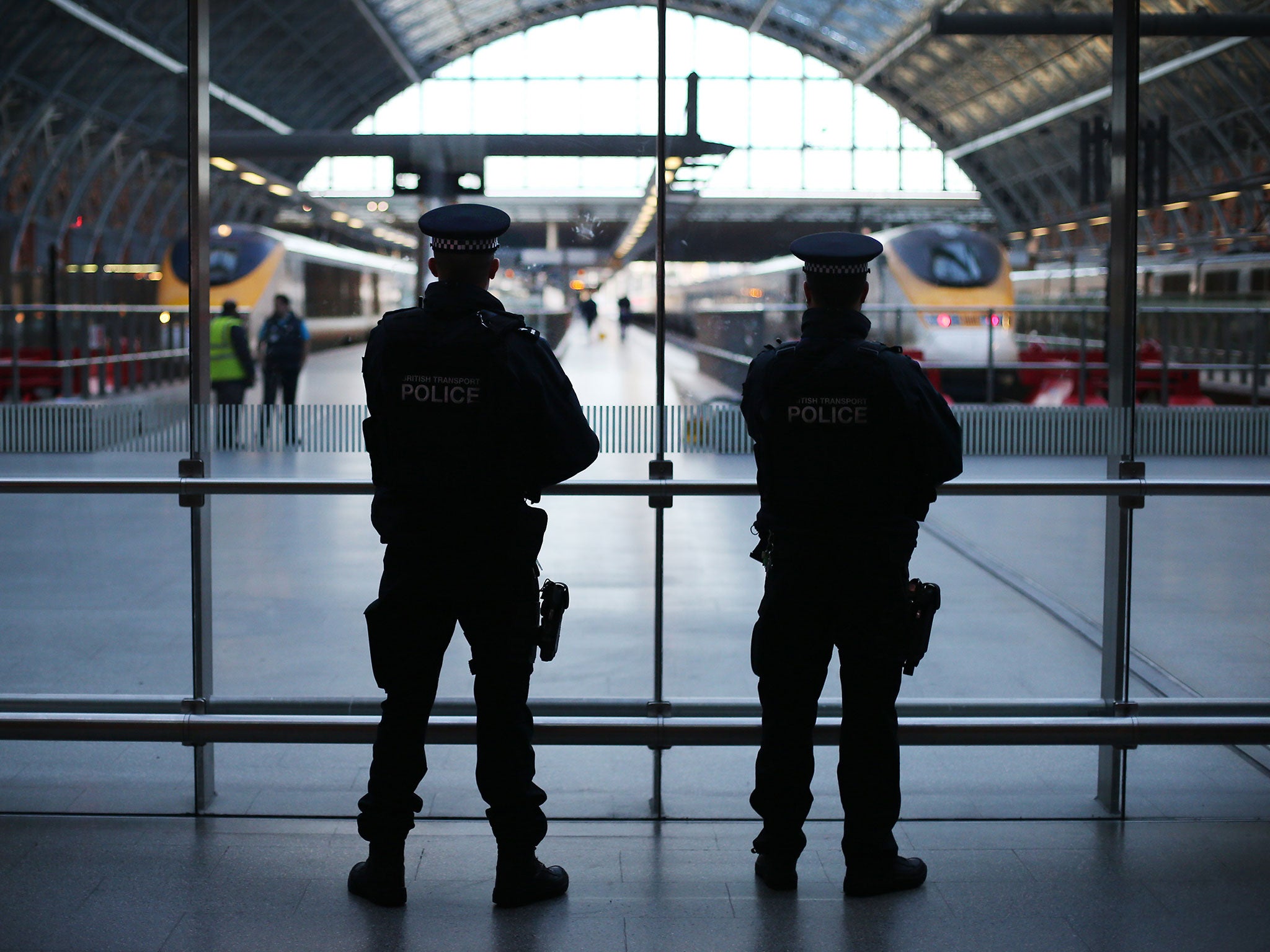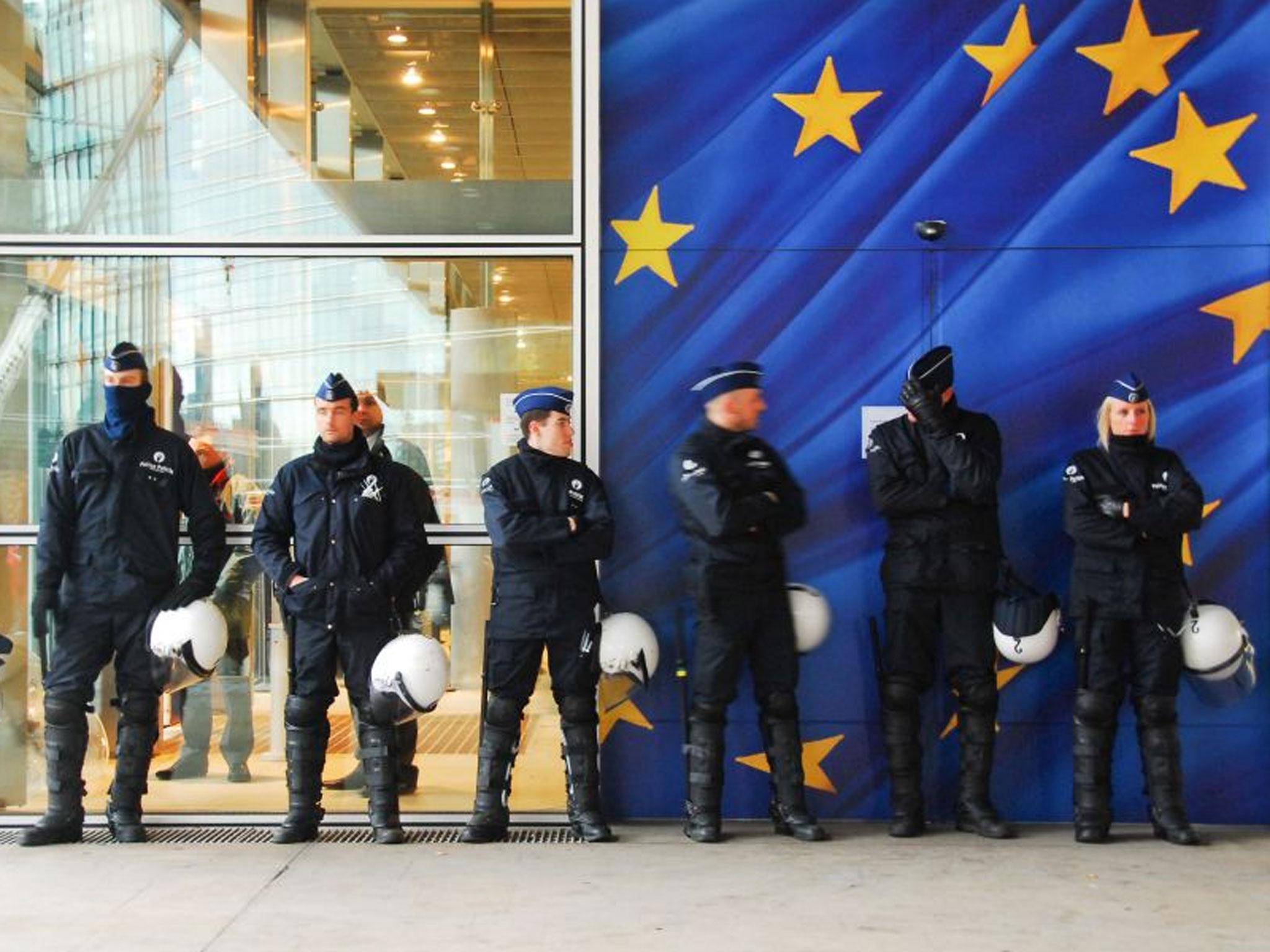Road to Brexit: Leaving EU could make it 'impossible' to tackle human trafficking, warn campaigners
In the next instalment of our Road to Brexit series, The Independent looks at the implications of the UK’s withdrawal from the EU for policing and security

Your support helps us to tell the story
From reproductive rights to climate change to Big Tech, The Independent is on the ground when the story is developing. Whether it's investigating the financials of Elon Musk's pro-Trump PAC or producing our latest documentary, 'The A Word', which shines a light on the American women fighting for reproductive rights, we know how important it is to parse out the facts from the messaging.
At such a critical moment in US history, we need reporters on the ground. Your donation allows us to keep sending journalists to speak to both sides of the story.
The Independent is trusted by Americans across the entire political spectrum. And unlike many other quality news outlets, we choose not to lock Americans out of our reporting and analysis with paywalls. We believe quality journalism should be available to everyone, paid for by those who can afford it.
Your support makes all the difference.Britain’s withdrawal from the EU could dramatically curtail efforts by UK police forces to tackle slavery and human trafficking, making it harder and in some cases “impossible” to protect victims from abuse, leading charities, the police and security experts have warned.
The loss of EU regulations, funding from Brussels and the jurisdiction of the European Court of Justice could scupper 20 years of work with European partners in tackling the trade in women and children for sex, they say.
Much of the UK’s existing legislation that addresses trafficking is derived from Brussels and campaigners warn it is the survivors of abuse who stand to suffer most from Britain’s exit from the bloc.
Legal experts have voiced particular concerns about safeguards offered by existing UK legislation in the form of the Modern Slavery Act, which they say fails to give adequate protection to victims, and the loss of EU justice powers that strengthen cross-border investigations and policing arrangements.
Tamara Barnett, a former political adviser on policing and crime for the Mayor of London who now works for the Human Trafficking Foundation, said “time and again lawyers are compelled to use EU law to defend victims of trafficking”.
“Without these laws in place, it will be much harder, in some cases impossible, to seek justice on a victim’s behalf, and that is obviously very worrying,” she told The Independent.
Theresa May triggered Article 50 at the end of March, firing the starting gun on two years of negotiations to sever ties between the UK and Brussels.
At stake are around 65 policing and criminal justice measures derived directly from Brussels.
Thirty-five of those were established before the Lisbon Treaty entered into force in 2009; laws and agreements which the then-home secretary Ms May described just three years ago as “vital” to UK security.
An additional 30 measures that came into law after that date, including the Passenger Name Record Directive, which forces airlines to hand EU countries their passengers' data to help the authorities to fight terrorism and serious crime, could also be lost after Britain’s withdrawal.
The UK also risks being cut adrift from Europol, the EU’s law enforcement agency, Eurojust, which coordinates prosecutions between member states, information sharing under the Prum Convention, and the European Arrest Warrant, which speeds up extraditions.
The implications will be felt not just in anti-trafficking and slavery measures, but counter-terrorism and policing of cyber and financial crimes, which are often committed across borders.
Christoph Meyer, a professor in EU security and politics at King’s College London, said maintaining intelligence sharing, including Europol and European fingerprint database, was reliant on “goodwill” from Europe – something that has been in short supply after Ms May appeared to use the issue as a "bargaining chip” in the negotiations.
“You have to be an EU member state to have access to that, or at least there has to be a lot of goodwill, and we don't know whether that will be there,” he said.

Dozens more regulations are at risk, including rules on freezing terrorists’ funds and tackling domestic violence.
One example of decisive European action is the 2005 Convention on Action against Trafficking in Human Beings, which brought in measures to support victims, including a "recovery and reflection period" when trafficked people cannot be deported.
The convention will remain in place after Brexit as it is a Council of Europe - rather than EU - initiative, but Ryan Mahan, of the campaign group Every Child Protected Against Trafficking, said it was an important example of the positive impact Europe could have on domestic policy.
“It is impossible to overstate the importance of the Convention on Action against Trafficking in Human Beings for obliging the UK Government to actually do something to tackle human trafficking," he said.
“Previously, the UK had been simply content to look the other way and consign thousands of victims in this country to a life of abuse and fear.
“Almost every significant trafficking victim-protection provision we have in law and policy in the UK has been implemented as a direct result of the Convention, including protecting victims of trafficking from prosecution for crimes they are forced to commit by their traffickers and providing every child with an independent advocate to stand up for their rights and look after their best interests.”
The issue of Brexit is centre stage of the general election campaign, with voters being offered the chance to deliver their verdict on Ms May’s decision to pursue a 'hard Brexit'.
A deal on security co-operation appears to be something that the Prime Minister has wanted to use as leverage for a trade deal, a tactic Downing Street has denied.
Whatever the outcome of the 8 June poll, the problem of trafficking and slavery shows no sign of going away. National Crime Agency (NCA) figures show the number of potential victims has more than doubled in three years, from 1,745 suspected trafficking victims in 2013 to 3,805 last year.
Children are increasingly being targeted, NCA data shows, with the number of referrals for under-18s rising by 30 per cent in a year, to 1,278 in 2016, from 982 a year earlier.
Mr Mahan said Brexit was likely to impact the security services’ ability “to prevent crimes against children and bring offenders to justice”.
“Any moves to retreat from cross-border initiatives to stamp out abuse will impact on vulnerable children most.
“We must not forget that British demand for cheap goods and sex plays its part in fuelling the trafficking of human beings, particularly children, from overseas.
“The UK also contributes to the export of sex offenders who prey on vulnerable children – 154 British offenders were detained in prisons abroad for child sexual abuse offences in 2015.”
The Modern Slavery Act, the cornerstone of anti-trafficking legislation in England and Wales, was created in part as a response to the UK’s obligations under the European Directive on preventing and combating trafficking.
However, unlike the Northern Irish and Scottish Human Trafficking and Exploitation Acts, there is no provision for the protection of the rights of victims of trafficking in England and Wales.
Kate Garbers, managing director of anti-slavery charity Unseen, said Brexit “threatens to weaken cross-border provisions that help protect some of the most vulnerable amongst” and warned that the “biggest impact will be felt by those who have been victims of this crime”.
“Whilst the Modern Slavery Act evidences the government’s intention to tackle this crime, which is to be recognised as a positive step forwards, there is a distinct lack of clarity offered within the Act in regards to the provision of victim protection,” she told The Independent.
“This needs to be addressed ahead of us leaving Europe and the protections of the EU Directive so we are in a position to ensure that all victims, regardless of nationality get access to the support they need.”
UK cooperation with its European neighbours has allowed police across the continent to crack down on organised criminals trading in people and sex.
One such effort, Operation Golf, involved a joint investigation team from the UK and Romania that helped dismantle one of Europe’s largest trafficking rings responsible for trafficking more than 1,000 children, including hundreds to the UK.
Twenty eight children were rescued as part of the operation and 126 individuals were arrested.
Phillipa Roberts, legal director at anti-slavery charity Hope for Justice, said there was still uncertainty about the impact of Brexit but said one fact would not change: modern slavery was a global phenomenon that could not be tackled by Britain working in isolation.
"As with most issues concerning Brexit, it is difficult to make predictions about what the UK leaving the EU will mean for victims of modern slavery,” she said.
“What should be made clear is that victims of modern slavery can be UK nationals, as well as nationals from EU and non-EU states - modern slavery is a problem within the UK's own borders, and beyond those of the EU.
“EU law provides important rights for victims of modern slavery. We are hopeful that Britain's decision to Brexit will not result in any compromise of these protections."
The body representing police forces across the UK has also appealed to the Prime Minister to maintain close ties with the continent.
A spokesperson for the National Police Chiefs’ Council (NPCC) told The Independent that human trafficking was one area where forces benefited most from close cross-Channel coordination.
“Ahead of the EU referendum, we clearly stated our need to work closely and at speed with European countries to keep people in the UK safe from threats including organised crime, child sexual abuse, cyber attack, and violent offenders. These requirements must be maintained as the UK leaves the European Union,” a spokesperson said.
"We are being clear on what is needed in order for us to retain our ability to share intelligence, biometrics and other data at speed, and to ensure we can continue to provide a quick, efficient and dynamic response to crime and criminals impacting the UK and its citizens, be it from serious and organised transnational crime or local level volume crime at the heart of UK communities.”
Prof Meyer said legal issues could scupper any deal that is reached on security, with disputes over data protection, privacy and human rights law likely to be stumbling blocks.
He told The Independent: “It is because the UK is a member of the EU and is signing up to all sorts of safeguards around data that they can access those databases.
“So if the UK tumbles out and walks away...it might be difficult to preserve that kind of access, because some of that access may have to be supervised by the European court of justice, and the UK has said we don't want that.”
He also issued a warning to those who claimed Britain’s well-resourced intelligence agencies could withstand the Brexit shock and keep Britain safe outside the EU.
“If the rest of the EU becomes less secure, can the UK insulate itself from that growing insecurity, from that loss of effectiveness? Or is it in some way inevitable that there is contagion from the EU becoming less effective at tackling organised crime.”
A Home Office spokesperson said the Government would "continue to work with all our global partners to tackle modern slavery".
“We have taken world-leading action to tackle it through the Modern Slavery Act, giving law enforcement agencies the tools they need, toughening up sentences and increasing support and protection for victims."
Join our commenting forum
Join thought-provoking conversations, follow other Independent readers and see their replies
Comments